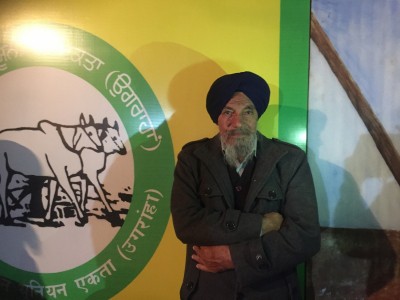By Sukant Deepak
New Delhi, Dec 24 : Since late November, a small gaushala near the Tikri border has been serving as a base for Joginder Ugrahan, the president of Bhartiya Kisan Union Ekta (Ugrahan). Visitors keep coming in to meet this 75-year-old former soldier in the Indian Army who hit the headlines after his union members publicly asked for the release of activists including Varavara Rao, Umar Khalid and others.
Over sips of freshly boiled milk, the utterly fit Ugrahan, flanked by his aides, roars, “I just don’t understand the big deal made out by the mainstream media over our demand to quash cases against poets, intellectuals, writers and student leaders booked under UAPA. They are the ones who have always guided and educated us. They elaborate on the effects of every new policy on common people like us. Their editorials, books and plays speak directly to us, for us. Now they don’t have unions who pressure the government. Therefore, we must. For it is our time to give back,” Ugrahan tells IANS.
When the union had marked the International Human Rights Day by holding up posters of activists arrested under UAPA, several union ministers including Piyush Goyal, Narendra Singh Tomar and Ravi Shankar Prasad claimed that the agitation had been infiltrated by pro-Maoists. Ever since the protests started, BKU (Ugrahan) has remained fiercely independent when it comes to its protest programmes although it has been coordinating with the other 31 other unions.
Even as television channels use terms like “tukde-tukde gang and anti-nationals” against them, Ugrahan, who launched his union in 2002, is clear that it is nothing new. “We have always been anti-establishment. But that is because we are pro-people. They may call us anything, but it does not take away the fact that we are working for the common person on the ground. By the way, the point for release of political prisoners was part of the joint demands submitted to the government.”
“Also, we have been holding rallies for release of political prisoners even before,” says Ugrahan whose union, which has a massive following in the Malwa region of Punjab, occupies the Tikri stages, while other unions are at the Singhu border.
Compared to Singhu, a much more sombre atmosphere rules at Tikri. The union leader says that they are very careful about who is allowed to be on the stage. Religious and political leaders are not allowed and potential speakers are subjected to a thorough background check. “We are maintaining strict discipline when it comes to who can speak from the stage,” he asserts.
Talking about youngsters from different universities across Punjab, Haryana, Delhi who have joined the agitation, with many of them not even remotely connected to agriculture, the union leader thinks that it is the general state of things that has pulled them towards the agitation. “Look at the prevailing unemployment, the frustration all over…Despite earning degrees, are they able to do well? A movement always encompasses many layers.”
Avoiding any comment against other unions who “disowned” them after posters of activists were shown, Ugrahan says that they are clear that despite all their differences, it is important to appear united and not criticise each other. “In a way, we are glad not to have been invited to the meeting with the Union Home Minister, Amit Shah earlier. After all, it was unscheduled and nothing emerged from those negotiations.”
Stressing that the political parties like Congress, AAP and SAD “saved their own skin” by not opposing the dharnas and rail roko organised by his union in Punjab, Ugrahan, whose union was pro-active for demanding compensation for families whose members committed suicide, feels that their increasing support base during this agitation has proven that it is a folly to dismiss the Left. “I am confident that this mass movement will awaken people across class barriers. The most interesting aspect is that those who have no direct connection to agriculture are coming forward to support us in different capacities. In many ways, we have already won — enlightening the people, making them think of the farming community and showing the importance of dissent in a democracy.”
Ugrahan feels that the challenge now is to continue ensuring that the agitation remains peaceful and disciplined, as it has been over the past one month. Adding that it would not have grown had it not been non-violent , the leader cites, “People near Tikri are not even charging us rent for rooms, shopkeepers are refusing to take money for small goods we buy from them. Many youngsters in the agitation feel that we should break the police barricades, enter Delhi and gherao the parliament. But that will mean violence. Then the fight will only be restricted for compensation etc. Being peaceful doesn’t mean we are weak. Also, to attack a peaceful movement is dangerous for any government, it would be political suicide. Just look at the kind of international attention we are getting.”
As we get to leave, the leader says, “You know, earlier we thought that the union will crumble once our generation dies. Now we can die in peace that it will not be the case.”
Disclaimer: This story is auto-generated from IANS service.

